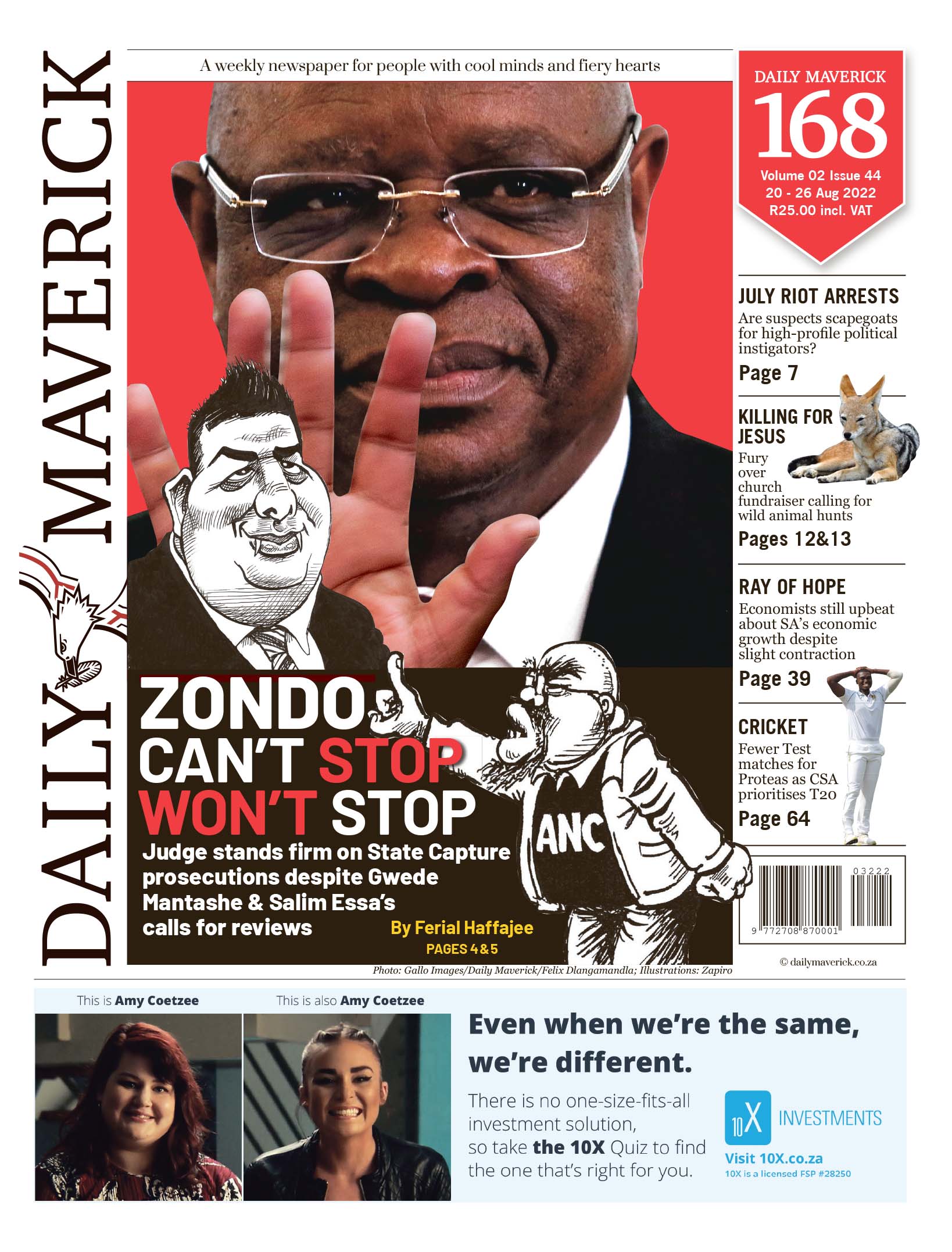South Africans should ensure that the State Capture Commission findings are not stalled for years by review applications of those offended by them, says Chief Justice Raymond Zondo, who chaired the commission.
“Those against whom findings have been made will definitely use litigation to stall, and to make sure that the recommendations end up never being implemented,” said Zondo in an interview.
The Gupta network mastermind Salim Essa and Mineral Resources and Energy Minister Gwede Mantashe have launched, and will launch, review applications, and more are expected. The six-part report makes numerous findings against those implicated in State Capture and, as the nearly 6,000-page report is digested, more reviews are expected.
“So, of course, those who have a right to lodge review applications will do so, [but] the people of [SA] will just need to be vigilant. Those who embrace the commission’s recommendations and who think these can contribute to a better [SA], to preventing a repeat of State Capture, what should they do?”
Commissions of inquiry can only make recommendations for further investigations and for policy changes. President Cyril Ramaphosa has said that he will complete and table his recommendations to Parliament by October.
But with the powerful now thudding review applications against the commission across its remaining offices and also amplifying their threats in the media, can it delay implementation?
Zondo says this should not happen. “Clearly, those against whom findings have been made will definitely use litigation to stall, and to make sure that these recommendations end up never being implemented.
“They’ve [the people who appreciate the commission’s work] got to say, how do we make sure that we don’t allow that litigation and those appeals to effectively result in no recommendations being implemented? So, that’s the biggest challenge, because if we are just going to say, ‘Look, they have a right to take whatever action and we must wait,’ it could be 10 years while we are waiting.”
Zondo said the rights of individuals bringing review applications had to be balanced against the rights of South Africans to have the commission’s findings implemented.
“Their rights to challenge the findings must be respected, but at the same time nobody has a right to ensure that this work of the commission is ultimately rendered ineffective. So, there might be a need to expedite processes, so that we don’t wait for years before there is finality. There might be a need to make sure that they are able to exercise their rights to challenge [the findings], but that these are not allowed to drag on for a long time. Steps may need to be taken to make sure, if there are appeals, they are acted upon and are decided by courts without delay and that any attempts to unduly delay be carefully watched,” said Zondo.
The Chief Justice will recuse himself from any review applications that may get to the Constitutional Court and no special reviews court will be set up.
“The high courts have got the experience and, in terms of the Constitution, they do most, if not all, reviews. So, what is important is simply to say what should be done to make sure that in certain categories of cases, at least, [these] should be expedited, because if they are not, the consequences for the country might be very bad.”
Essa has threatened the commission with a damages claim because he is named 806 times in the report, according to a report by Jessica Bezuidenhout in Daily Maverick. He had lawyers on brief throughout the hearings.
The businessman, now based in Dubai, is at the centre of State Capture allegations at three different state-owned companies. He has alleged in his legal papers that the reports made hearsay findings against him, but in fact, the commission’s investigators had to provide evidence to back up every finding it made.
Detailed money-flow forensic investigations by Paul Holden of Shadow World Investigations revealed how companies in the Gupta network, and allegedly controlled by Essa, exported rents out of South Africa and across the world. Essa is under sanction by both the UK and the US. Like the Guptas, Essa wanted the right to cross-examine witnesses and to give testimony from Dubai. The commission declined the demand.
Mantashe said in March when the first commission report was released that he would take it on review. He said in interviews that the fact that the commission had referred the findings against him for further investigation showed that [it] could not make a case of corruption against him. In fact, the commission cannot make findings and has to refer for further investigation by the National Prosecuting Authority (NPA) because it is different from the police or the prosecuting services.
The reports found that Mantashe had received three different security upgrades to various properties of his from Bosasa, the second major corruption network investigated by the commission.
Mantashe told the commission that the upgrades were gifts from Papa Leshabane, a Bosasa employee and also a friend of many ANC leaders, and made in the spirit of ubuntu.
The ANC’s head of the crime and anti-corruption committee, Tony Yengeni, developed the governing party’s first response to the State Capture Commission. In it, he accused Zondo of straying into political territory by making recommendations including that the party’s cadre deployment policy was unlawful and unconstitutional. But the commission was “political” by its nature in that it made recommendations about governance and policy to guard against the continuation of State Capture networks.
The ANC has set up a committee to review the State Capture Commission findings, chaired by National Executive Committee member Jeff Radebe. It has also said that party members against whom findings have been made by the commission must appear before its integrity commission within months.
On Sunday, Rapport newspaper reported that Ramaphosa has said that the State Capture Commission findings were not binding. The DA is in court seeking an order that ANC cadre deployment be stopped in the light of the Commission’s findings that the policy is unlawful and unconstitutional. DM168
This story first appeared in our weekly Daily Maverick 168 newspaper, which is available countrywide for R25.
Guide to State Capture
“Over three years, the Zondo Commission heard testimony in 429 hearings from hundreds of people; 779 videos were broadcast on to television screens or desktops of people watching while they worked, or on to the mobile phones of a transfixed nation. The testimony is contained in 429 transcripts over 138,019 pages. That is 276 reams of paper about the story of corruption in South Africa.”
And now, one book to explain it all.
Maverick451 is proud to announce the upcoming publication of award-winning journalist Ferial Haffajee’s Days of Zondo: The fight for freedom from corruption.
The Commission of Inquiry into State Capture brought us staggering testimonies showing the breadth and depth of how South Africa was captured.
Haffajee shines a spotlight on the infamous players, from the Guptas to former president Jacob Zuma, Salim Essa, Ace Magashule, former NPA boss Shaun Abrahams, Brian Molefe, Bosasa’s Angelo Agrizzi, and many ministers, associates, business leaders and companies.
She explains how this level of corruption became so ingrained, how much money was lost, who needs to answer for State Capture and what accountability could come from it.
With contributions from Ivor Chipkin and an exclusive interview with Judge Raymond Zondo himself, Days of Zondo is the definitive guide to the commission.
The book is now available for preorder from the Daily Maverick Shop and is due for release at the end of September. DM168





 Justice Raymond Zondo hands over the fifth and final Zondo Commission Report into State Capture at the Union Buildings in Pretoria on 22 June 2022. (Photo: Gallo Images / Alet Pretorius)
Justice Raymond Zondo hands over the fifth and final Zondo Commission Report into State Capture at the Union Buildings in Pretoria on 22 June 2022. (Photo: Gallo Images / Alet Pretorius) 